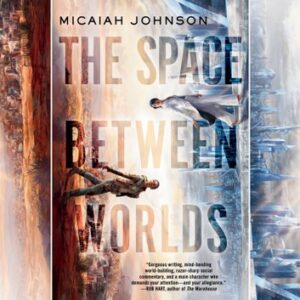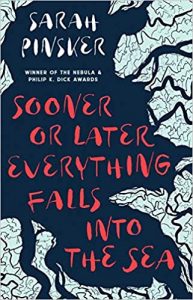Buy this from Bookshop.org to support local bookstores and the Lesbrary!
Ava just broke up with her partner, Jules. They both work at an Ikea-like furniture store, but they’ve been managing to work different shifts after the breakup… until today. That’s already awkward enough before they discover a portal and are tasked with going through it together to retrieve a customer’s grandmother who wandered into it and is now lost in the multiverse. Don’t worry: in exchange for risking their lives, they will receive a gift card from corporate.
This was exactly what I was hoping it would be. Finna is a novella, and it feels almost like a montage as they run through different multiverses, including ones with carnivorous armchairs and hivemind employees. It’s a zany adventure that reminded me a bit of Doctor Who, especially the episodes that don’t take themselves too seriously.
Grounding the wackiness of the setting is the dynamic between Ava and Jules. You can see how much they care about each other and why they were together for so long—and why they broke up. Ava has anxiety and depression, and Jules is neurodivergent. Often their different ways of thinking end up with them clashing: Jules rushes into things and can be a bit erratic, which is hard for Ava to plan for and stresses her out. This isn’t really a second-chance romance story: there’s good reason they broke up, and because it’s so fresh, they have a lot of anger and hurt around it still. It’s more like a second-chance friendship, trying to recover any sort of friendship from the rubble of their breakup.
I thought the balance between the over-the-top adventure story and the very human main characters worked well. Jules is nonbinary and Black, and we also see how they have difficulty being accepted and fitting in, especially in combination with their neurodivergence. It creates layers of conflict: the life-or-death, sci-fi, world-jumping stakes of the plot with the complicated, painful complexities of their relationship as they’re forced to work together to survive. As you’d expect from the premise, it’s also an anti-capitalist story that explores the horrors of working retail.
If you’re a fan of books that use an out-there premise to explore characterization and relationship dynamics, I highly recommend this one. It was the perfect book to read in one sitting during a readathon.



